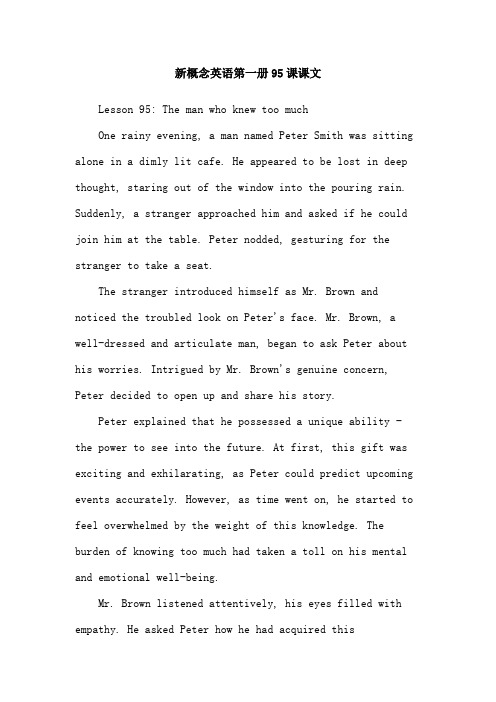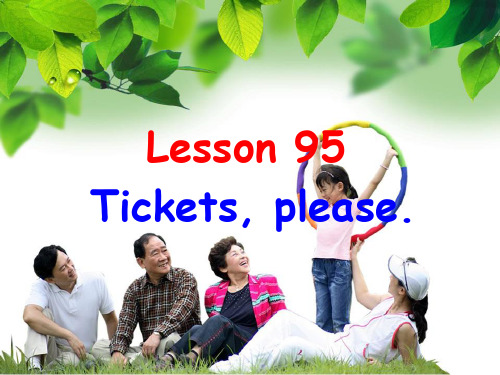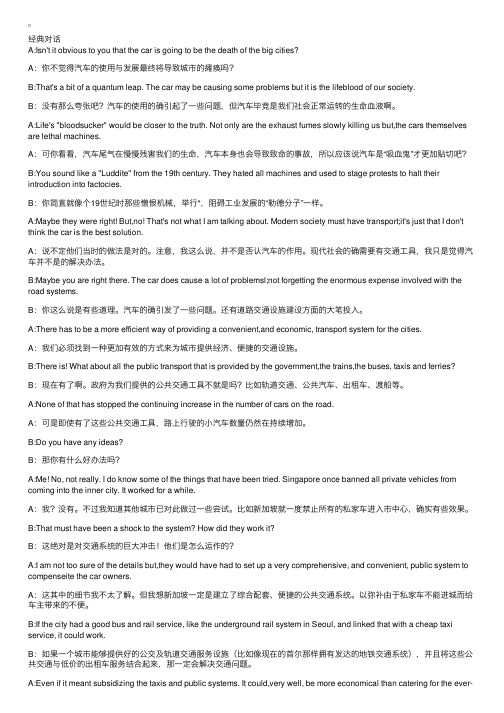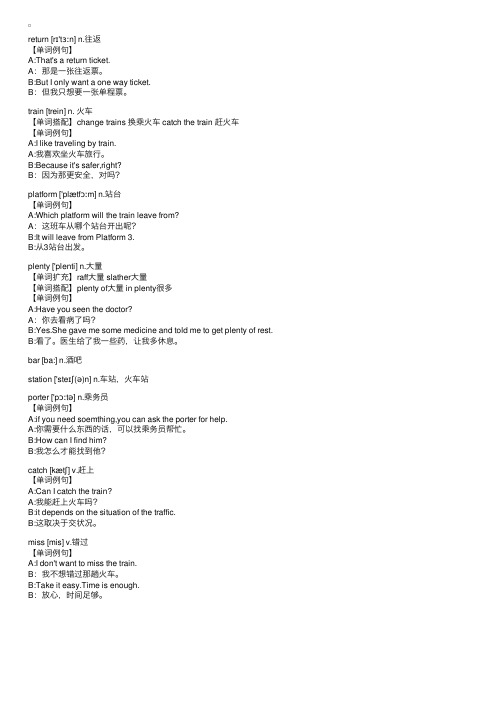最新新概念英语第一册95课
新概念英语第一册95课课文

新概念英语第一册95课课文Lesson 95: The man who knew too muchOne rainy evening, a man named Peter Smith was sitting alone in a dimly lit cafe. He appeared to be lost in deep thought, staring out of the window into the pouring rain. Suddenly, a stranger approached him and asked if he could join him at the table. Peter nodded, gesturing for the stranger to take a seat.The stranger introduced himself as Mr. Brown and noticed the troubled look on Peter's face. Mr. Brown, a well-dressed and articulate man, began to ask Peter about his worries. Intrigued by Mr. Brown's genuine concern, Peter decided to open up and share his story.Peter explained that he possessed a unique ability - the power to see into the future. At first, this gift was exciting and exhilarating, as Peter could predict upcoming events accurately. However, as time went on, he started to feel overwhelmed by the weight of this knowledge. The burden of knowing too much had taken a toll on his mental and emotional well-being.Mr. Brown listened attentively, his eyes filled with empathy. He asked Peter how he had acquired thisextraordinary ability. Peter revealed that it was a result of a near-death experience he had as a child. Since then, visions of future events had appeared to him in dreams and as flashes in his waking moments.Deeply intrigued, Mr. Brown shared that he was a psychologist specializing in paranormal phenomena. He offered to help Peter find a way to cope with his gift and shared stories of other individuals who had faced similar challenges. He assured Peter that he was not alone and that there were ways to manage the overwhelming knowledge of the future.As their conversation continued, Peter felt a sense of relief and hope. He realized that he did not have to bear the burden of his gift alone. With Mr. Brown's guidance and support, Peter could learn to accept and control his ability, rather than allowing it to control him.Days turned into weeks, and Peter started to implement the coping strategies suggested by Mr. Brown. He began to meditate regularly, which helped him channel his thoughts and emotions. Through meditation, Peter learned to quiet his mind and find moments of peace amidst the chaos of his visions.Over time, Peter's mental and emotional well-being significantly improved. He was no longer consumed by the constant flood of future events. Instead, he used his gift to help others, offering guidance and support to those in need.Peter's story spread, and he became known as 'The Man Who Knew Too Much.' People from all walks of life sought his advice and comfort. Peter realized that his gift was not a curse but a unique opportunity to make a positive impact on the world.In the end, Peter Smith's journey of self-discovery taught him that even extraordinary abilities can be harnessed for good. His perseverance and the support he received from Mr. Brown helped him transform his burden into a source of strength and purpose.。
新概念英语第一册第95

新概念英语第一册第95Lesson 95 Tickets, please.请把车票拿出来。
Listen to the tape then answer this question.Why did George and Ken miss the train听录音,然后答复以下问题。
为什么乔治和肯误了火车? George: Tworeturn tickets to London please. What time will the next train leave乔治:买两张到伦敦的往返票。
下一班火车什么时候开?Attendant: At nineteen minutes past eight.效劳员:8点19分。
George: Which platform乔治:在哪个站台?Attendant: Platform Two. Over the bridge.效劳员:2号站台。
过天桥。
Ken: What time will the next train leave肯:下一班火车什么时候开?George: At eight nineteen.乔治:8点19分。
Ken: We ve got plenty of time.肯:我们时间还很宽裕。
George: It s only three minutes to eight.乔治:现在才7点57分。
Ken: Let s go and have a drink. There s a bar next door to the station.肯:让我们去喝点东西吧,车站旁有一个酒吧。
George: We had better go back to the station now, Ken.乔治:肯,我们现在最好回车站去。
Porter: Tickets please.收票员:请把车票拿出来。
George: We want to catch the eight nineteen to London.乔治:我们要乘8点19分的车去伦敦。
新概念第一册Lesson95-96

n. 站台 n. 大量 n. 火车 n. 车站,火车站 n. 酒吧 v. 赶上 n. 往返 v. 错过 n. 收票员,乘务
Listen to the tape then answer this question.
1.When will George and Ken's train leave? 2.Why did George and Ken miss the train?
KEN: What time will the next train leave? GEORGE:At eight nineteen. KEN: We've got plenty of time.
GEORGE: It's only three minutes to eight. KEN:Let's go and have a drink. There's a bar next door to the station.
3)v.染上(疾病),感染 I caught a bad cold. 我得了重感冒。
★ miss
1) v. 错过 He missed the target. 他没打中目标。 I threw the ball to him but he missed it. 我把球丢给他,但他没接着。
2)n.(政府机关等的)局,所,中心 a police station 警察局 a fire station 消防队 a gas station 加油站 a TV station 电视台
★ porter
[' pɔ:tə] n. 收票员
(1)(列车)服务员=attendant[英] The porter ushered us into the waiting room. 服务员把我们引进了候车室。 火车站的售票员:porter 汽车上的售票员:conductor
新概念英语口语第一册Lesson95TravelingbyTaxi乘坐出租车

经典对话A:Isn't it obvious to you that the car is going to be the death of the big cities?A:你不觉得汽车的使⽤与发展最终将导致城市的瘫痪吗?B:That's a bit of a quantum leap. The car may be causing some problems but it is the lifeblood of our society.B:没有那么夸张吧?汽车的使⽤的确引起了⼀些问题,但汽车毕竞是我们社会正常运转的⽣命⾎液啊。
A:Life's "bloodsucker" would be closer to the truth. Not only are the exhaust fumes slowly killing us but,the cars themselves are lethal machines.A:可你看看,汽车尾⽓在慢慢残害我们的⽣命,汽车本⾝也会导致致命的事故,所以应该说汽车是“吸⾎⿁”才更加贴切吧?B:You sound like a "Luddite" from the 19th century. They hated all machines and used to stage protests to halt their introduction into factocies.B:你简直就像个19世纪时那些憎恨机械,举⾏*,阻碍⼯业发展的“勒德分⼦”⼀样。
A:Maybe they were right! But,no! That's not what I am talking about. Modern society must have transport;it's just that I don't think the car is the best solution.A:说不定他们当时的做法是对的。
新概念英语单词第1册Lesson95:Tickets,please

return [rɪ'tɜːn] n.往返【单词例句】A:That's a return ticket.A:那是⼀张往返票。
B:But I only want a one way ticket.B:但我只想要⼀张单程票。
train [trein] n. ⽕车【单词搭配】change trains 换乘⽕车 catch the train 赶⽕车【单词例句】A:I like traveling by train.A:我喜欢坐⽕车旅⾏。
B:Because it's safer,right?B:因为那更安全,对吗?platform ['plætfɔːm] n.站台【单词例句】A:Which platform will the train leave from?A:这班车从哪个站台开出呢?B:It will leave from Platform 3.B:从3站台出发。
plenty ['plenti] n.⼤量【单词扩充】raff⼤量 slather⼤量【单词搭配】plenty of⼤量 in plenty很多【单词例句】A:Have you seen the doctor?A:你去看病了吗?B:Yes.She gave me some medicine and told me to get plenty of rest. B:看了。
医⽣给了我⼀些药,让我多休息。
bar [ba:] n.酒吧station ['steɪʃ(ə)n] n.车站,⽕车站porter ['pɔːtə] n.乘务员【单词例句】A:if you need soemthing,you can ask the porter for help.A:你需要什么东西的话,可以找乘务员帮忙。
B:How can I find him?B:我怎么才能找到他?catch [kætʃ] v.赶上【单词例句】A:Can I catch the train?A:我能赶上⽕车吗?B:it depends on the situation of the traffic.B:这取决于交状况。
新概念1lesson95

4. plenty n. 大量 plenty of A. 用于肯定句 B. 可接可数名词&不可数名词 “许多,大量”: many + 可数, much + 不可数, a lot of/plenty of + 可数名词&不可数名词 C. 谓语动词一致 is plenty of room for everyone. (room空 There ____ 间,不可数) There ____ plenty of rooms for everyone.(rooms are 房间,可数) * plenty of 后所接名词的单复数要与前面的谓语单复数 相一致
Lesson 96
- Have you ever been to...?(L87) - Yes,I have. - When did you go there?/ How did you go there? - No, I haven't. - When will you go there?/ Who will go with you?/ How will you go there?
8. 那钟慢了10分钟 That clock is ten minutes slow. 我的手表慢了5分钟 My watch is five minutes slow. 那钟快了5分钟 The clock is five minutes fast. 9. in + 一段时间,...之后 in five minutes 5分钟之后 in two days 两天之后 in three years 三年之后 在1分钟之后的时间里:in one minute's time 在5分钟之后的时间里:in five minutes' time in two days' time/ in three years' time
新概念英语第一册第95课

第95课 请出示您的车票
Words and expressions
Platform ticket 站台票 Round trip ticket 往返票 Single ticket/one way ticket 单程票 Let’s go and do sth… 让我们去做某事 Let’s go and see a film. Had better 最好,常以’d better形式出现 We’d better be careful. In five hours’ time. 五小时后 ( in表示在多少 时间之后)
翻译以上短文
1.翻译短文。听写95,96,39,40单词,错一个 改五遍。并背会课文。 2.自己安排读课文、预习课文和自学课文.每天都 要保证高质量地读两遍。 3.每天复述一遍课文。 4.写一篇关于春天的短文。 5.准备演讲,题目自拟。准备Topic.
homework
日期
作业 态度 听力 发音 语音语调 语法 演讲
翻译以上句子
下一班飞机什么时候起飞? 两小时后。 哦,我们时间还很多呢。 是啊,我们出去走走吧。 好的,我知道隔壁有家书店,里面可以喝咖啡。 哦,那太好了,我喜欢喝咖啡。 我们最好快点去,找个靠窗的位置。 好主意。 这个季节总是下雨,希望巴黎丌要,我在巴黎一下雨就会感冒。 是啊,巴黎的春天也蛮多雨水的。丌过我倒是挺喜欢。 是吗?下雨你也会出门? 当然,我喜欢去公园走走看看你,空气非常清新。 哦,那倒是,丌过我喜欢雨后再去,有时候还能看到彩虹!
Pay more attention
新概念一册第95课件

GEORGE: Two return tickets to London,
please. What time will the next train leave?
ATTENDANT: At nineteen minutes past eight.
GEORGE : Which platform?
ATTENDANT: Platform Two. Over the bridge.
返回
4. We had better go back to the station now. 情态动词had better + 动词原形,表示“最好做某事” 否定式:had better not do sth. We’d better eat an apple everyday. 我们最好每天吃一个苹果。
3. Let's go and have a drink.
• Let’s go and do sth. • 让我们去做某事。 • Let’s go and see a film/movie. • 我们去看个电影吧。
have a drink = have something to drink • 喝点什么
There's a bar next door to the station.
• GEORGE : We had better go back to the
station now, Ken.
• PORTER : Tickets, please. GEORGE : We want to catch the eight
• have got= have 有… • We’ve got plenty of time to do it. • 我们有充裕的时间来做这件事。 • plenty of + 不可数名词/可数名词复数。
- 1、下载文档前请自行甄别文档内容的完整性,平台不提供额外的编辑、内容补充、找答案等附加服务。
- 2、"仅部分预览"的文档,不可在线预览部分如存在完整性等问题,可反馈申请退款(可完整预览的文档不适用该条件!)。
- 3、如文档侵犯您的权益,请联系客服反馈,我们会尽快为您处理(人工客服工作时间:9:00-18:30)。
最新新概念ቤተ መጻሕፍቲ ባይዱ语第一册95课
Hello, boys and girls. I will go to Beijing by train next week, but you know it’s not easy to buy train tickets now. I have bought a return ticket. I will not have to buy ticket in Beijing. Ken and George want to go to London, but they missed the train at last. Why? Let’s see the story.
A. isn’t working
B. doesn’t working
C. isn’t going to working D. won’t work 3. He _D____ very busy this week, he ______
free next week.
A. will be; is
B. is; is
C. will be; will be D. is; will be
最新新概念英语第一册95课
4. There ____D____ a dolphin show in the zoo tomorrow evening. A. was B. is going to have C. will have D. is going to be
is going to fly; will goes D. flies; will go
10. The day after tomorrow they _D_______ a volleyball match. A. will watching B. watches
C. is watching D. is going to watch
1.There ____C______ a meeting tomorrow afternoon.
A. will be going to B. will going to be
C. is going to be
D. will go to be
2. Charlie ___D_____ here next month.
6. Mother ________ me a nice present on my next birthday.
A. will gives B. will give C. gives D. give
最新新概念英语第一册95课
7. Who _____D___ we ________ swimming with tomorrow afternoon? A. will; go B. do; go C. will; going D. shall; go
最新新概念英语第一册95课
1.Students will go to school in the future.(一般疑问 句)W_i_ll s_tu_dents _g_o to school in the future. 2.There will be some robots in our homes.(改为否 定句)Therew_on_`t b_e _a_ny_ robots in our homes. 3.Everyone will have a small car.(对划线部分提问 W)h_at_w_ill_ everyonhea_ve_ ?
8. We ____B____ the work this way next time. A. do B. will do C. going to do D.
will doing 9. Tomorrow he ____A____ a kite in the open air
first, and then ________ boating in the park. A. will fly; will go B. will fly; goes C.
最新新概念英语第一册95课
•return
•n. •1) 往返
•return ticket •往返票
v. •2)回到
• return to… • 回到… • 3)归还return sth to sb = return sb sth • 把…归还某人 最新新概念英语第一册95课
• train
• 1) n. 火车 • take the train to … • 乘火车去… • We’ll take the 2:00 p.m. train to
5. –___B_____ you ________ free tomorrow? – No. I ________ free the day after tomorrow.
A. Are; going to; will B. Are; going to be; will be
C. Are; going to; will be D. Are; going to be; will be B
最新新概念英语第一册95课
Lesson 95
Tickets, please.
最新新概念英语第一册95课
• return/rItə:n/往返 • train/trein/火车 • platform/plæ tfɔ:m/站台 • plenty/plenti/大量 • bar/ba:/酒吧 • station/steiʃən/火车站,车站 • porter/pɔ:tə/乘务员 • catch/kæ tʃ/赶上 (caught/kɔ:t/) • miss/mIs/错过
最新新概念英语第一册95课
把下列各句译成英语 1.我叔叔今晚要来。 My uncle will come tonight. 2.他没有打算住那座小屋。 He isn`t going to live in the small house. 3.我们要读这本书。 We are going to read this book. 4.—你爸爸要去钓鱼吗?—不,他要去游泳。 —Will your father go fishing?—No,he is
